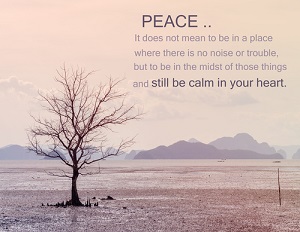
I was reading an article by a psychologist just recently and he was putting forward the idea that some stress is good for you.
He was suggesting that in the absence of stress we would find ourselves sitting around, doing nothing and completely unmotivated.
His theory was that you need stress to get you going and to get things done.
In my work as a coach I have often had clients who came along with the idea that being busy-minded and highly keyed up is a good idea.
So, do we need to feel stress or tension (even mild tension) to get the best from ourselves?
There are several myths about stress that it is highly beneficial to clear up because with a deeper understanding we become open to new and far more effective ways to operate in the world.
Myth 1 – Stress is caused by external circumstances
This is not true. Stress is an inner experience that comes from your thinking. You could be in what is generally considered a ‘stressful experience’ and be as calm as a millpond. This is because when your mind is free and clear then you will not feel stressed, regardless of your situation.
Myth 2 – I need to control my world
Control is the attempt to force people and events to conform to your way of doing things. But, the need to control is born from insecurity. It is a product of the ego; the idea that you and what you want is all-important.
Giving up the need to control brings you back into flow and out of the stressful thinking of the separate self.
Myth 3 – I need to manage stress
There are lots of ‘experts’ dishing out advice on ‘stress management’. Go to the gym, go for a walk, take a break, eat well, avoid caffeine, etc.
None of these techniques address the underlying cause of stress, which is the misunderstanding that life is inherently stressful.
If applying a technique worked consistently for all people then why are so many people stressed-out?
Myth 4 – I can cope with stress
The idea of coping comes from the belief that stress is inevitable and it is your ability to handle it or put up with it that is important.
But people do not cope with chronic stress. It does not matter who you are, if you are constantly flooding your system with stress hormones and experiencing the physiological effects of stress then there are always consequences.
Good health is our greatest asset and yet something that it is easy to take for granted – until we no longer have it.
By far the best way to eliminate stress is to understand it rather than an attempt to cope with it.
Myth 5 – Stress is a requirement to be highly productive
Stress is not the same as focus. We can be highly focused on what we are doing but without the physiological effects of stress. The stress response to protect us from immediate and short-term danger, not as a way of operating in our day to day lives.
What persistent stress is telling you
Deepak Chopra, in ‘The book of secrets’ wrote, “Pain exists so that illusion won’t keep getting away with its tricks.”
Stress is our minds way of telling us to let go of what we are making up (illusion). So, stress is a tap of the shoulder. A wake-up call.
But if we think that stress is information about our situation or circumstances then it will continue to show up and prevent us from living happier and healthier lives.


